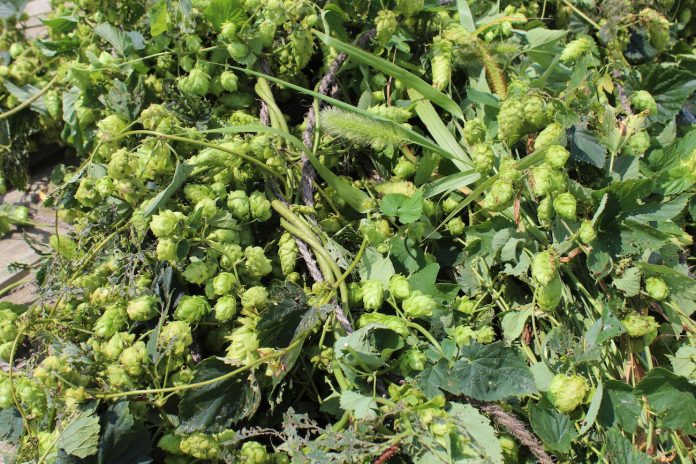A new course aims to teach aspiring hop farmers how to grow hops and successfully market them to local brewers.
Hops for Brewing begins Jan. 11, with its first online meeting, but participants can join the program any time in the first month. It’s a hybrid program, with online and in-person components hosted by Shippensburg University.
The course is being taught by Alison Feeney, professor of geography and earth science at Shippensburg University and author of “For the Love of Beer: Pennsylvania Breweries”; hop farmer Michael Reifsnyder, of GEMS Farm, in Carlisle, Pennsylvania; and brewer David Kozloski, cofounder of Gearhouse Brewing Company, in Chambersburg, Pennsylvania.
Marketing key
This program is unlike others because it focuses heavily on the farming side and, also, the marketing and brewing.
Too often, farmers don’t make those connections with brewers until it’s too late in the process to be useful to brewers, Feeney said. They don’t ask what varieties brewers want or need or if they want fresh hops or dried, pelletized hops.
“There has to be that connection with the brewer, because that brewer needs to be able to plan when he’s going to brew, what he’s going to brew,” Feeney said. “There has to be a lot of dialogue between the brewer and the farmer.”
There will be lessons on how to plant, grow, manage and harvest hops, as well as lessons on how the brewing process works, what brewers look for, how to make those connections with brewers. They will also talk about the agritourism potential from hop farms.
The Hops for Brewing course is part of Shippensburg University’s efforts to fill a gap in brewing education and training programs in the state. The university has held several short courses on brewing and continues to develop more.
Some of the larger commercial hop farms in Pennsylvania are only 3 or 4 acres. Farmers in some other states farm less land but work as a cooperative and combine their harvest to make it go further.
Hops can be a tricky crop to grow well and grow profitably, but it doesn’t take a lot of land to get started.
“People with a quarter acre or half acre can develop a hop farm,” Feeney said.
Details
The program is starting off in the first two months with prerecorded online lectures and reading material. The lectures are short, about 15-20 minutes each. Participants can watch them and learn at their own pace, Feeney said. The group will meet online every two weeks so participants can ask questions of the instructors and socialize.
Starting in March, as the weather gets better and it will be safe to meet outside, they hope to hold some in-person meetings and lessons. The plan is to go to a hop farm to see the early season preparation and bine stringing, visit Gearhouse Brewing to see how beer is brewed and meet at different breweries to socialize.
Depending on where participants are located, there may be some in-person meetings held for smaller groups in different parts of the state.
The cost to register is $100, thanks in part to a Specialty Crop Block Grant from the Pennsylvania Department of Agriculture.
The cost includes all instructional materials, tastings, meals and refreshments, a book on hops and a hop rhizome to get aspiring farmers started. To register or to get more information, visit apply.ship.edu/register/HopsforBrewing.
(Reporter Rachel Wagoner can be contacted at 800-837-3419 or rachel@farmanddairy.com.)










